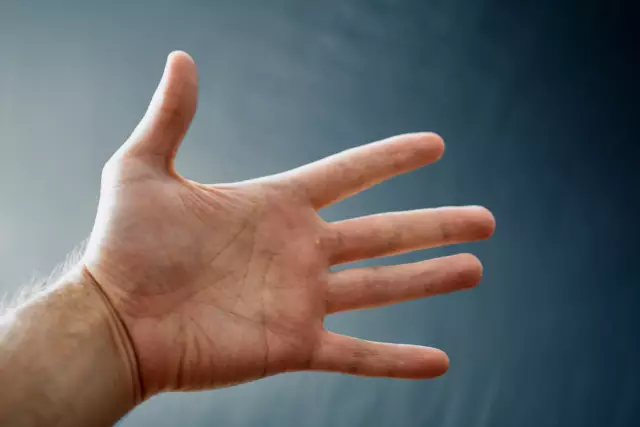- Author Rachel Wainwright wainwright@abchealthonline.com.
- Public 2024-01-15 19:51.
- Last modified 2025-11-02 20:14.
Lips go numb: reasons for what to do
The content of the article:
- Description of the symptom
-
Causes of lip numbness
- Complication after tooth extraction
- Hypoglycemia
- Trigeminal neuritis
- Hypertensive crisis
- Allergic reaction
- Vitamin deficiency
- Osteochondrosis
- Stroke
- Multiple sclerosis
- What to do if lips go numb
- Diagnostics
- Treatment
- Video
Lip numbness is not only an unpleasant phenomenon, but often an important symptom of any pathology. Numbness indicates a lack of sensitivity in the lip area. There is no single explanation for why lips go numb - there may be several reasons for this condition. Therapy is selected taking into account the underlying disease, often using medication methods of treatment.

Lips can go numb for various reasons, some of which require treatment
Description of the symptom
The lips are a very sensitive area. There are a hundred times more nerve endings on the lips than on the fingers. Two nerves are responsible for innervation - the trigeminal and facial. Sensory innervation is provided by the branches of the trigeminal nerve.
Numbness in any part of the body or face indicates sensory impairment. The reason often lies in the damage to the nerve tissue - peripheral nerves or roots. Less commonly, paresthesia (a feeling of crawling, tingling, numbness) occurs as a result of brain damage.
Lip numbness rarely occurs in isolation. You need to pay attention to other symptoms:
- numbness in other areas - the tongue, chin, tip of the nose, arms and legs;
- pathological changes in the affected area - edema, redness, rashes;
- other symptoms are soreness, impaired mobility, increased blood pressure.
Causes of lip numbness
The causes of lip numbness are varied. There are many nerve endings in this anatomical region, so sensory disturbances are not uncommon. Short-term numbness can occur due to an uncomfortable position of the head during sleep, with attacks of fear and panic attacks. In these cases, paresthesias pass quickly, do not affect the human body and do not cause much concern. At the same time, numbness of the lips can be a symptom of various diseases (see the table of contents of the directory of nervous diseases).
Complication after tooth extraction
Often the lower lip becomes numb after a wisdom tooth is removed. Do not worry if this symptom is present for a short time, these are only the consequences of anesthesia.
If the lip becomes numb for more than a day, and the unpleasant phenomenon is accompanied by other clinical manifestations, you need to consult a doctor. Most likely, the cause lies in the damage to the nerve. In this case, the chin and tongue also go numb.
Hypoglycemia
Numbness can be a sign of hypoglycemia. Hypoglycemia is a condition in which blood glucose levels are low. Most often, hypoglycemia occurs with diabetes mellitus, for which insulin is used. An incorrectly selected dose or a violation of the insulin delivery technique causes a drop in glucose levels.
In addition to the fact that the upper lip becomes numb with glycemia, there are other manifestations:
- severe hunger;
- general weakness, dizziness;
- muscle tremors;
- cold sweat;
- aggressive behavior, irritability.
Trigeminal neuritis
The cause of paresthesia may be damage to the nerve responsible for sensory innervation. The defeat of the trigeminal nerve can occur in the form of neuritis and neuralgia. The localization of numbness depends on which branch of the trigeminal nerve is affected:
- maxillary nerve - upper lip, upper cheek;
- mandibular nerve - lower lip, lower cheek, chin.
Paresthesia is not the only symptom of trigeminal nerve damage. Almost always, with this pathology, severe pain is observed in the affected area.
Hypertensive crisis
Paresthesia can be a symptom of a hypertensive crisis - a sharp increase in blood pressure. Not only lips grow numb, but also other parts of the face, upper limbs. Symptoms are due to an impaired blood supply.
The main symptom of a hypertensive crisis is high blood pressure. Additional symptoms may also be present:
- headache;
- noise in ears;
- redness of the skin of the face;
- weakness.
Allergic reaction
Paresthesias may indicate the development of an allergic reaction. Lips become numb, tingling, burning appears. These are signs of angioedema - a local allergic reaction, in which the face swells mainly.
Angioedema develops in response to contact with an allergen. The allergen may be:
- food products;
- dust;
- pollen of plants;
- medications;
- household chemicals.
Paresthesias are not the only symptom of allergies. The affected area swells and increases in size. Shortness of breath may develop if the airways are swollen.
Vitamin deficiency
Numbness can be caused by damage to peripheral nerves due to vitamin deficiency. B vitamins, especially B12, are responsible for the normal functioning of the nervous tissue.
The manifestations are not specific:
- numbness;
- tingling, burning;
- crawling feeling;
- muscle weakness.
Any sensory and movement disorders can be signs of hypovitaminosis.
Osteochondrosis
The cause of paresthesia can be osteochondrosis, a degenerative disease of the spine. With cervical osteochondrosis, the nerves that innervate the facial area are affected. How cervical osteochondrosis manifests itself:
- numbness of the lips, chin, cheeks;
- dizziness;
- headache;
- neck pain;
- numbness of the upper limbs.
The reason for the development of these symptoms is the compression of the nerve roots and blood vessels by bone outgrowths (osteophytes).
Stroke
The most dangerous cause of numbness of the lips is an acute disturbance of cerebral circulation - a stroke. Sensory impairment occurs due to the depletion of blood flow in the brain.
Numbness is far from the only symptom of a stroke. The following clinical manifestations come to the fore:
- impaired limb mobility (often one-sided - left or right);
- speech disorder;
- paralysis of the muscles of the face - the corner of the mouth, eyelids are down;
- lack of coordination.
Stroke and transient ischemic attacks are serious diseases that require immediate medical attention. If their symptoms are detected, you should immediately consult a doctor.
Multiple sclerosis
In rare cases, paresthesias are a symptom of multiple sclerosis. The disease is characterized by the formation of foci of sclerosis in different parts of the nervous tissue.
The clinical manifestations of multiple sclerosis are diverse:
- muscle weakness;
- motor disturbances - twitching of the arm or leg;
- lack of coordination;
- tremor;
- nystagmus;
- incontinence of urine and feces;
- tingling and burning of the fingers.
What symptoms will occur during the disease depends on the localization of the foci of sclerosis (cranial nerves, spinal cord, cerebellum).
What to do if lips go numb
Lip numbness is not always an alarming symptom. If this is the first time this sensation has arisen and there are no other signs, there is no need to worry. If the numbness occurs not for the first time, accompanied by headache, muscle stiffness or other symptoms, you need to see a doctor.
First, it is necessary to undergo an examination, since without identifying the cause, treatment cannot be prescribed. To get rid of an unpleasant symptom, you need to cure the underlying disease. For this, different methods are used - diet, medications, folk remedies.
Diagnostics
To determine the cause, it is necessary to identify additional symptoms, conduct a physical examination, and take tests. To begin with, general clinical studies are prescribed, and if necessary, a more narrow examination is carried out. Diagnostics includes the following studies:
| Variety | Study title | Explanation |
| General clinical | Blood pressure measurement | A significant increase in blood pressure indicates a hypertensive crisis. When measuring, it is important to pay attention to both the upper numbers (systolic pressure) and the lower ones (diastolic). |
| Oral examination | Examination of the oral cavity is especially important if your face starts to go numb after a tooth is extracted. Pay attention to the condition of the gums, teeth, the presence of pain. | |
| General blood analysis | You need to pay attention to the number of red blood cells and the level of hemoglobin. Low scores indicate anemia, which may be causing discomfort. | |
| Blood glucose | A decrease in blood glucose (below 2.2-2.4) indicates hypoglycemia. | |
| Special | Spine X-ray | Changes in the spine can be detected with osteochondrosis, tumor formations. |
| Computed tomography (CT) of the brain | With the help of CT, it is possible to assess the state of the blood supply to the brain, to identify masses. |
Studies should be prescribed by a doctor, taking into account all clinical manifestations and anamnesis of the disease.

When lips become numb, a dental examination may be required
Treatment
Treatment directly depends on the cause that led to the numbness. Symptomatic treatment is not used, the underlying disease needs to be treated. In some cases, treatment is not required at all, the numbness goes away on its own.
| Disease | Treatment |
| Hypovitaminosis | Vitamins of group B - B12, B6 are prescribed parenterally. |
| Dental complications | The oral cavity is sanitized. |
| Hypoglycemia | Stop insulin delivery, eat something sweet, or drink juice. |
| Hypertensive crisis |
One of the antihypertensive drugs is prescribed: • Nifedipine; • Clonidine; • Furosemide; • Captopril. It is necessary to reduce the pressure gradually, during the first 2 hours by no more than 25% of the initial level. |
| Trigeminal neuritis |
Treatment depends on the cause of the nerve inflammation. If neuritis is traumatic in nature, you need to find out if the nerve is pinched. If it is restrained, it must be released (remove the filling mass, reposition the fragment). Medications are also prescribed: • anti-inflammatory (Ibuprofen, Diclofenac, Nimesulide); • vitamins of group B. |
| Stroke | For a stroke, emergency treatment is performed. An ambulance should be called immediately. Treatment consists of restoring blood flow (medically or surgically). |
| Osteochondrosis | Treatment should be comprehensive. Prescribed medications, exercise therapy, fixation of the spine in the cervical spine. Surgical treatment can be used. |
Video
We offer for viewing a video on the topic of the article.

Anna Kozlova Medical journalist About the author
Education: Rostov State Medical University, specialty "General Medicine".
Found a mistake in the text? Select it and press Ctrl + Enter.






